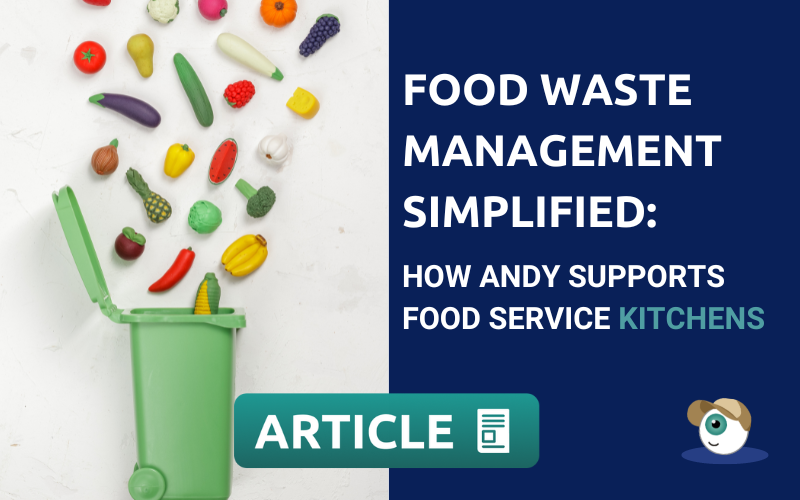Food Waste Management Simplified: How Andy Supports Food Service Kitchens

September 29th marked the International Day of Awareness of Food Loss and Waste, a global call to action to address one of the most pressing challenges of our time.
This year, the focus is on the critical need for investment in food waste management solutions that address food loss and waste throughout the entire food chain.
At Andy 🧢, we share this commitment and continuously work with our clients to provide innovative tools to help them optimise their operations, reduce costs, and contribute to a more sustainable future.
In this article, we’ll show you how Andy can help you navigate the complexities of compliance and implement effective strategies to reduce food waste in your business.
The Global Food Waste Crisis: A Hidden Epidemic
Food waste is not merely a statistic we repeat endlessly on a day like today.
Food waste is a pervasive problem with far-reaching consequences.
The Food and Agriculture Organization of the United Nations (FAO) estimates that a staggering one-third of all food produced globally is lost or wasted.
This hidden epidemic has profound implications for our planet, our economies, and our communities.
A Triple Threat: The Environmental, Economic, and Social Costs
- Environmental Impact: Food waste contributes significantly to climate change due to methane emissions from landfills. It also squanders precious resources like land, water, and energy, exacerbating environmental degradation.
- Economic Burden: The financial toll of food waste is immense. It leads to losses for businesses, consumers, and governments, driving up food prices and reducing the profitability of food businesses.
- Social Impact: Food waste exacerbates global hunger and food insecurity, particularly in developing countries. It’s a moral travesty to waste resources that could be used to feed those in need.
The Hospitality Industry: Culprit and Catalyst
The hospitality industry plays a particularly significant role in food waste. Restaurants, hotels, and catering businesses often struggle with inventory management, food spoilage, and minimising leftovers. These challenges contribute to a culture of waste that has detrimental effects on both the environment and the bottom line.
It’s time to turn the tide on food waste. By addressing the root causes and implementing sustainable practices, the hospitality industry can play a pivotal role in mitigating this global crisis.
The Need to Legislate Food Waste Management
The global food waste crisis demands urgent action.
While voluntary initiatives and industry best practices can make a significant impact, there is a growing recognition of the need for stronger regulatory frameworks to address this issue.
Our home country Spain has taken a proactive step in combating food waste with the recent passage of its food waste law.
This law establishes a hierarchy of use for food, prioritising human consumption. If food is not suitable for human consumption, it must be used for animal feed or energy purposes.
One of the key provisions of the law is the obligation for food producers and distributors to donate surplus food that is still fit for consumption. This helps to ensure that food reaches those in need and reduces the amount of food that ends up in landfills.
The law also requires businesses to implement food waste management and prevention plans and to collaborate with food banks and non-governmental organisations to donate surplus food. This promotes a more sustainable and responsible approach to food management.
Overall, Spain’s new food waste law is a significant step towards addressing the global issue of food waste and promoting a more sustainable food system.
Fortunately, Spain it’s not alone in addressing food waste through legislation.
Other countries have also implemented or are considering food waste management regulations:
- France: France has enacted strict laws to reduce food waste, including penalties for businesses that waste food.
- Italy: Italy has introduced regulations to promote the donation of surplus food and to reduce food waste in the supply chain.
- Germany: Germany has implemented various measures to combat food waste, such as promoting food banks and supporting initiatives to reduce food waste in the agricultural sector.
- United States: While there isn’t a comprehensive federal law on food waste management in the US, several states and cities have implemented regulations or initiatives to address the issue. For example, California has a food waste reduction law that requires large-scale food generators to donate or compost their food scraps.
- Canada: Canada has been exploring ways to reduce food waste, including through voluntary initiatives and partnerships between businesses, governments, and non-profit organizations.
- Japan: Japan has implemented various measures to reduce food waste, including promoting food banks and encouraging businesses to donate surplus food.
- China: China has been taking steps to address food waste, with initiatives such as the “Clean Plate Campaign” and regulations to reduce food waste in the catering industry.
As the global awareness of this issue grows, we can expect to see more countries implementing regulations and initiatives to reduce food waste and promote sustainability.
Andy: Optimising Food Waste Management Worldwide
Born and developed in Spain, food safety and kitchen operations software Andy, has been a game-changer for Spanish businesses struggling to comply with the new food waste regulations.
Our team of experts collaborates closely with our clients to ensure that Andy meets their specific requirements and helps them navigate the complexities of food waste management.
By streamlining daily tasks, Andy alerts kitchen teams to potential issues, and suggests effective solutions:
- Boosting productivity: Manual tasks are reduced and your team’s time freed up.
- Minimising waste: Teams can identify and prevent food waste through intelligent insights.
- Cutting costs: Teams can optimise operations and reduce expenses.
Specific Features and Benefits of Food Waste Management with Andy
How does Andy facilitate the management of additional procedures arising from Food Waste Legal requirements?

Daily production sheets
Andy simplifies the tedious task of filling out daily production sheets, freeing up time for other important tasks in the kitchen. With Andy, the records from all your restaurants are organised and stored digitally so that any kitchen staff, managers, or external inspectors can access them immediately and in real-time.
Expiry date tracking
Andy automatically calculates expiration dates and includes the most relevant information on labels, which you can easily print using Brother printers. This eliminates errors, reduces labelling time from 1 hour to just 33 minutes, and keeps all records unified and accessible at any time.
Andy promotes good stock rotation and helps your employees follow the FIFO (First In, First Out) method.
Waste tracking
Andy guides the employee in managing the unavoidable waste and losses of goods, clearly indicating the differences between the real stock and what’s registered in Andy. This way, you have complete control of your products in real-time from one single place, with evidence of the tasks being performed, always prepared for the requirements of health authorities.
Correct reception of raw materials
Did the product arrive at the right temperature? In the right condition? In the expected quantities? Digitize the answers to all these questions easily with Andy, simplifying your team’s tasks, reducing the time they spend on them, eliminating human error, and ensuring real-time access to your data at any moment. Additionally, Andy guarantees the proper functioning of the food transport vehicle, monitoring temperatures, mechanics, and cleanliness.
Donation tracking
Which organization are your donations going to? What quantities are you transporting? How are you transporting them? Manage and answer these and many other questions quickly and effectively with your new kitchen digital assistant, and comply with the inspections and requirements of the new law without any headaches.
Detailed tracking
Andy allows you to manually log removed products and the amount of waste generated.
Historical reports
Generate reports to identify patterns and trends in waste over time.
All information is organised in one place, simplifying reviews and audits.
Complete tracking of the food’s lifecycle, from reception to discard, allowing you to take preventive actions. Additionally, Andy allows you to maintain detailed records with the following logs:
- Discarded products control: Documentation of the reasons and the destination of discarded products.
- Daily trash bin counts: Record of approximate amounts of waste.
- Monthly and annual reports: Summary of accumulated waste over time.
Training and communication
Training your team and onboarding processes become much easier with your digital assistant. With Andy, task planning and logging become much simpler, and tracking best manufacturing practices across the team, including transport staff, becomes a 100% intuitive process. Plus, if there are any doubts, they can stay updated on food safety with the many articles Andy provides in its library.
The Impact of food waste management with Andy on Your Business
When you invest in Andy, you’re not just investing in technology; you’re investing in your team.
By automating routine tasks, Andy:
- Boosts morale: Your team will appreciate having a tool that makes their jobs easier.
- Improves efficiency: Streamlined processes lead to increased productivity.
- Enhances compliance: Ensure your business meets all food safety and waste reduction regulations.
- Reduces costs: Lower food waste and operational expenses.
Why choose Andy for your food waste management?
- User-friendly: Easy to learn and use, even for those who aren’t tech-savvy.
- Comprehensive: Covers all aspects of food safety management, HACCP, food labelling, auditing, kitchen operations and food waste management.
- Scalable: Grows with your business.
By leveraging Andy’s features, businesses can not only meet regulatory requirements but also achieve significant improvements in their operations, sustainability, and bottom line.
But remember: it’s not just about staying compliant…It’s about saving the planet! Only together can we achieve real change.
👉🏽 TRY ANDY 100% FREE TODAY 👈🏽


